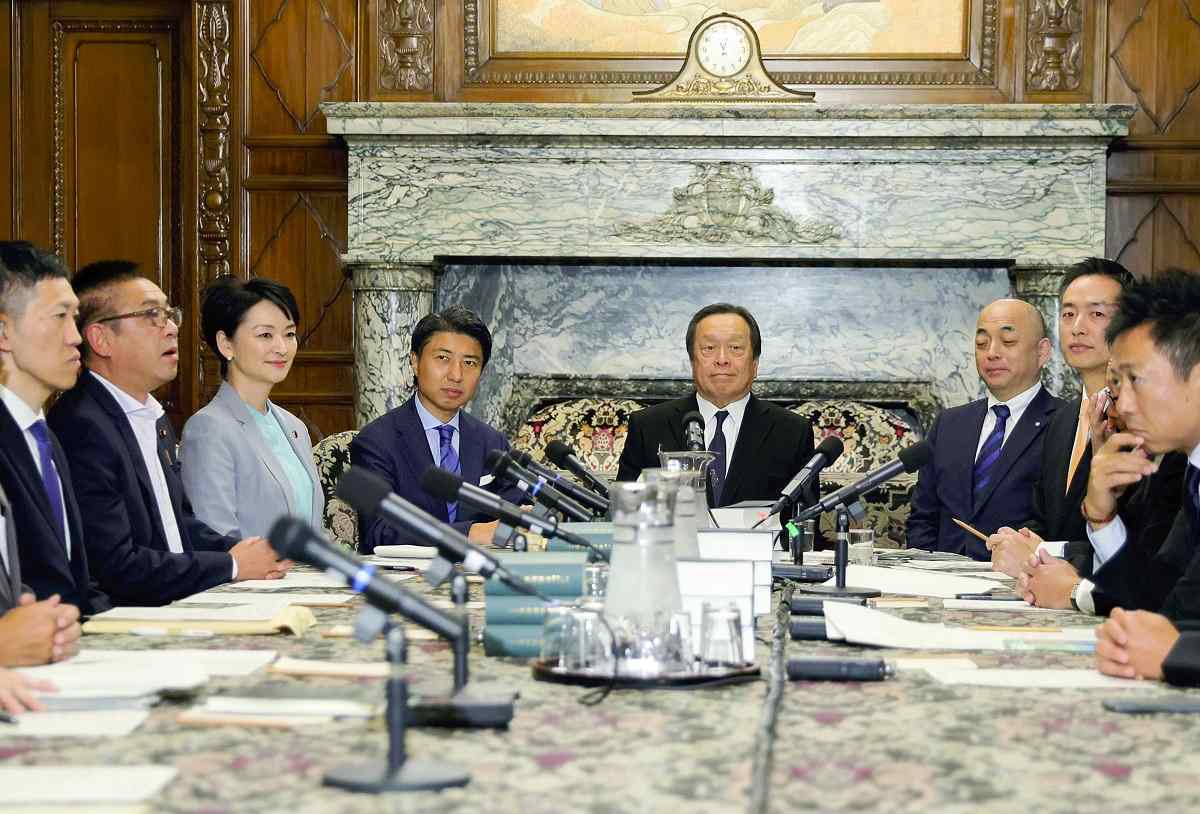Opposition Takes Initiative in Tug-of-War over Committee Chair Posts; Chairmanship Split Goes from 15-2 to 10-7

Ruling and opposition party members attend a meeting of the council of parliamentary groups in the lower house in Tokyo on Friday.
20:18 JST, November 9, 2024
The tug-of-war over committee chairperson posts in the House of Representatives has ended with the opposition parties taking the initiative.
Although the Liberal Democratic Party initially took a strong stance in negotiations with the opposition parties, it was forced to make significant concessions after the ruling party and its junior partner Komeito lost their majority in last month’s lower house election. Going forward, the ruling coalition will surely face challenges in handling Diet affairs.
At a press conference Friday, Yoshihiko Noda, leader of the Constitutional Democratic Party of Japan, expressed his enthusiasm for future Diet deliberations as the CDPJ gained a significant number of committee chairperson posts.
“The landscape of the Diet is about to change,” he said. “I want to go ahead with reforms that will make people say, ‘This is what Diet deliberations are all about.’”
On Friday, in advance of the special Diet session to be convened Monday, the council of parliamentary groups in the House of Representatives discussed the formation of the lower house and decided on the distribution of posts such as the chairmanships of the house’s standing and special committees.
The allocation of the chairperson posts for the 17 standing committees changed significantly. Before the election, 15 of them were allocated to the ruling parties and two to the opposition parties. The ruling bloc will now have just 10 posts, while the opposition parties will have seven.
After the negotiations, the CDPJ secured five of the seven chairperson posts. “The agreement came close to fully meeting our demands,” a satisfied CDPJ senior official said.
At a council meeting that began on Nov. 1, the LDP initially maintained a tough stance, insisting on keeping the same number of posts as before the lower house election. The opposition parties balked at this demand, bringing the discussions to an impasse.
However, the negotiations developed to the opposition’s advantage, because the ruling coalition failed to win a majority in the general election. The opposition parties were confident that they would be able to push through their demands if the discussions in the council broke down and the decision was put to a vote in the plenary Diet session.
Although the opposition parties were unable to agree on a single candidate for the election to designate the prime minister, which will be held in the upcoming special Diet session, they were united in their demand for chairperson posts.
“From the beginning, we knew we didn’t have a chance of winning in this negotiation,” a senior LDP official admitted.
The focal point of the discussions was the post of lower house budget committee chairperson, a potential symbol of changes in the control of the Diet.
The LDP gave up the chairmanship of the Budget Committee in exchange for retaining that of the Rules and Administration Committee, which has the task of fixing the dates of plenary sessions necessary to send bills to the House of Councillors.
CDPJ member Jun Azumi is expected to assume the chairmanship of the Budget Committee. He is well-versed in the handling of Diet affairs.
During the discussions, the CDPJ, which is the largest opposition party, also demanded the position of chair of the Judicial Affairs Committee. The CDPJ, which advocates the introduction of a selective surname system for married couples, was so determined to secure the post that it even gave up other committee chair posts to the LDP.
Since Komeito is also in favor of introducing such a system, it is possible that discussions on this issue will move forward in the ordinary Diet session that will begin at the start of next year.
It was also decided that the CDPJ would secure the chairmanship of the Special Committee on Political Reform, allowing the party to step up its offensive against the LDP over the issue of politics and money, amid the political funds scandal involving some of the LDP’s factions.
On the other hand, the LDP tenaciously defended its hold on the position of chair of the Cabinet Committee.
The LDP made this move to prepare for the deliberations on a bill to introduce active cyber defense against major cyberattacks. There are calls from both the ruling and opposition parties for the creation of such a bill in order to strengthen the Japan-U.S. alliance, among other reasons.
The government plans not to submit the bill to the extraordinary Diet session to be convened later this year. However, Prime Minister Shigeru Ishiba has instructed digital minister Masaaki Taira to speed up work on it in hopes of submitting the bill to the Diet at an early date.
Democratic Party for the People leader Yuichiro Tamaki also expressed his intention to cooperate in deliberations on the bill. “We will cooperate on creating this legislation, so it should be done quickly,” he said.
Top Articles in Politics
-

Japan PM Takaichi’s Cabinet Resigns en Masse
-

Sanae Takaichi Elected Prime Minister of Japan; Keeps All Cabinet Appointees from Previous Term
-

Japan’s Govt to Submit Road Map for Growth Strategy in March, PM Takaichi to Announce in Upcoming Policy Speech
-

LDP Wins Historic Landslide Victory
-

LDP Wins Landslide Victory, Secures Single-party Majority; Ruling Coalition with JIP Poised to Secure Over 300 seats (UPDATE 1)
JN ACCESS RANKING
-

Producer Behind Pop Group XG Arrested for Cocaine Possession
-

Japan PM Takaichi’s Cabinet Resigns en Masse
-

Japan Institute to Use Domestic Commercial Optical Lattice Clock to Set Japan Standard Time
-

Man Infected with Measles Reportedly Dined at Restaurant in Tokyo Station
-

Israeli Ambassador to Japan Speaks about Japan’s Role in the Reconstruction of Gaza






















